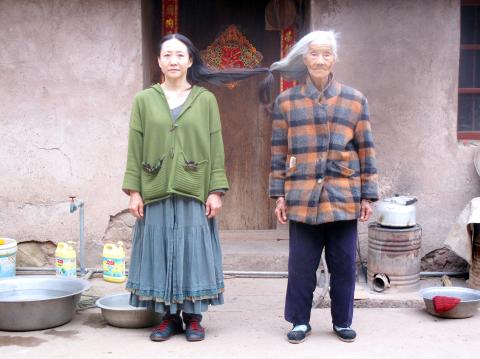This year’s Women Make Waves Film Festival (女性影展) seeks to break down, re-interpret and set free the concept “woman.” The festival, which runs through Oct. 18, features a lineup of more than 80 feature, documentary, short, experimental and animated works from 22 countries.
Festival director Su Ying-ju (蘇盈如) says the annual event is more than just a platform for female filmmakers to show films about women to women.
“The concept of woman is not limited to the biologically female. It can be a reflection of oneself, a point of view, a vision or a critique of the system. The feeling of being marginalized, silenced and invisible can exist in anybody’s mind,” Su told the Taipei Times.

Photo courtesy of Women Make Waves
Appropriately, this year’s theme, The F Word, can mean many different things. Works included in the Fucking Nation section, for example, examine the individual within the political and social sphere. Among them, Pioneer Heroes begins with three Russian kids joining a propaganda organization that encourages its young members to inform on their parents in 1987, the twilight years of the Soviet Union. As the regime crumbles, the trio grow to become successful professionals living in present-day Moscow, while their fervent belief in collectivism seems to have disappeared.
Su says that the Russian drama can reflect and resonate with those in Taiwan who grew up after the Martial Law era.
“There is clearly a generational gap. Taiwanese in their 30s didn’t experience the authoritarian regime directly, but its legacy lingers on, sometimes through the education system. The important thing is how to face and deal with the system which we are critical of, but has already become part of us,” Su says.

Photo courtesy of Women Make Waves
WOMEN’S ADVENTURES
Su says that several films were chosen because they focus on a female adventure narrative and contrast conventional narratives of masculinity such as conquering and heroism.
Daughter, for example, tells the heartfelt story of a mother and daughter fleeing child marriage in Pakistan’s tribal regions, while Wanja tells the story of a 40-year-old former bank robber and her struggles to reintegrate into society after serving a long prison sentence.

Photo courtesy of Women Make Waves
HISTORY UNVEILED
Forgotten history is revealed in documentaries such as We Came to Sweat: the Legend of Starlite, the story of Starlite, the oldest black gay bar in Brooklyn and a safe haven for people of different race and sexual orientation.
History is also a predominant theme among the 22 films nominated in the Taiwanese competition section, which was initiated last year to encourage Taiwanese female filmmakers.
The Double Life of Li Xianglan (李香蘭的世界) explores the issues of identity, nationality and gender by making an intriguing parallel between the life of Li Xianglan, a China-born Japanese movie star during World War II, and that of her friend Liu Na-ou (劉吶鷗), a Taiwan-born, Japan-educated filmmaker.
With Hebei Taipei (河北台北), director Lin Nien-hsiu (李念修) examines his father’s past as he reminisces about his youth as a solider fleeing to Taiwan in 1949.
To mitigate the lack of understanding of contemporary Chinese female filmmakers and their works in Taiwan, festival organizers put forth a mini program curated by US-based Chinese film scholar Zhang Zhen (張真) that introduces five important figures to local audiences. Among them, Listening to Third Grandmother’s Story (聽三奶奶講過去的事情) is renowned choreographer Wen Hui’s (文慧) first documentary, which examines her family’s memories.
The film is part of the project initiated by Wen and Wu Wenguang (吳文光), internationally known as a founding figure of Chinese independent documentary, with an aim to unearth and preserve the nation’s past by interviewing village elders.
For something sexier, several queer flicks by established queer filmmakers offer “insiders’” viewpoints into their worlds, often in a subversive and fun manner. The Foxy Merkins, for example, is billed as a lesbian hooker buddy comedy about a hooker duo and their street encounter with bargain-hunting housewives and the Republican ladies. Meanwhile, Vagina is the Warmest Color is a hilarious parody of the Cannes-winning and male-centric Blue is the Warmest Color by Tunisian-French director Abdellatif Kechiche.
“When we talk about queers and lesbians, we usually talk about the issues and problems. But the fun part is on the cultural level. There is much creativity [in queer film], and they are so different from mainstream culture,” Su says.

In Taiwan there are two economies: the shiny high tech export economy epitomized by Taiwan Semiconductor Manufacturing Co (TSMC, 台積電) and its outsized effect on global supply chains, and the domestic economy, driven by construction and powered by flows of gravel, sand and government contracts. The latter supports the former: we can have an economy without TSMC, but we can’t have one without construction. The labor shortage has heavily impacted public construction in Taiwan. For example, the first phase of the MRT Wanda Line in Taipei, originally slated for next year, has been pushed back to 2027. The government

July 22 to July 28 The Love River’s (愛河) four-decade run as the host of Kaohsiung’s annual dragon boat races came to an abrupt end in 1971 — the once pristine waterway had become too polluted. The 1970 event was infamous for the putrid stench permeating the air, exacerbated by contestants splashing water and sludge onto the shore and even the onlookers. The relocation of the festivities officially marked the “death” of the river, whose condition had rapidly deteriorated during the previous decade. The myriad factories upstream were only partly to blame; as Kaohsiung’s population boomed in the 1960s, all household

Allegations of corruption against three heavyweight politicians from the three major parties are big in the news now. On Wednesday, prosecutors indicted Hsinchu County Commissioner Yang Wen-ke (楊文科) of the Chinese Nationalist Party (KMT), a judgment is expected this week in the case involving Hsinchu Mayor Ann Kao (高虹安) of the Taiwan People’s Party (TPP) and former deputy premier and Taoyuan Mayor Cheng Wen-tsan (鄭文燦) of the Democratic Progressive Party (DPP) is being held incommunicado in prison. Unlike the other two cases, Cheng’s case has generated considerable speculation, rumors, suspicions and conspiracy theories from both the pan-blue and pan-green camps.

Stepping inside Waley Art (水谷藝術) in Taipei’s historic Wanhua District (萬華區) one leaves the motorcycle growl and air-conditioner purr of the street and enters a very different sonic realm. Speakers hiss, machines whir and objects chime from all five floors of the shophouse-turned- contemporary art gallery (including the basement). “It’s a bit of a metaphor, the stacking of gallery floors is like the layering of sounds,” observes Australian conceptual artist Samuel Beilby, whose audio installation HZ & Machinic Paragenesis occupies the ground floor of the gallery space. He’s not wrong. Put ‘em in a Box (我們把它都裝在一個盒子裡), which runs until Aug. 18, invites